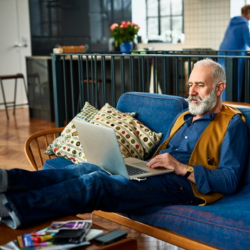To provide the best experiences, we use technologies like cookies to store and/or access device information. Consenting to these technologies will allow us to process data such as browsing behaviour or unique IDs on this site. Not consenting or withdrawing consent, may adversely affect certain features and functions.
The technical storage or access is strictly necessary for the legitimate purpose of enabling the use of a specific service explicitly requested by the subscriber or user, or for the sole purpose of carrying out the transmission of a communication over an electronic communications network.
The technical storage or access is necessary for the legitimate purpose of storing preferences that are not requested by the subscriber or user.
The technical storage or access that is used exclusively for statistical purposes.
The technical storage or access that is used exclusively for anonymous statistical purposes. Without a subpoena, voluntary compliance on the part of your Internet Service Provider, or additional records from a third party, information stored or retrieved for this purpose alone cannot usually be used to identify you.
The technical storage or access is required to create user profiles to send advertising, or to track the user on a website or across several websites for similar marketing purposes.
 A large increase in investment in breakthrough technologies such as hydrogen-based fuels, bioenergy and carbon-capture storage solutions is needed to hit the global goal of net zero emissions by 2050. To scale these technologies and take them to market, at least a tenfold increase in investment is needed, according to the How to Finance Industry Net-Zero report. Released by the World Economic Forum and Oliver Wyman, the report outlines how to address the supply-and-demand-side gap and take these technologies to the next level. (more…)
A large increase in investment in breakthrough technologies such as hydrogen-based fuels, bioenergy and carbon-capture storage solutions is needed to hit the global goal of net zero emissions by 2050. To scale these technologies and take them to market, at least a tenfold increase in investment is needed, according to the How to Finance Industry Net-Zero report. Released by the World Economic Forum and Oliver Wyman, the report outlines how to address the supply-and-demand-side gap and take these technologies to the next level. (more…)









 New research into workplace discrimination, commissioned by
New research into workplace discrimination, commissioned by 
 The company of your work friends can make a long day fly by, with many of us finding long lasting friendships in the workplace. To find out more about how much people love their colleagues,
The company of your work friends can make a long day fly by, with many of us finding long lasting friendships in the workplace. To find out more about how much people love their colleagues, 
 Christoph Kargruber will be taking over as
Christoph Kargruber will be taking over as 
 The proportion of people over 50 in employment is set to hit 47 percent by 2030, following a 36 percent increase in the absolute number the last two decades, according to a new report from
The proportion of people over 50 in employment is set to hit 47 percent by 2030, following a 36 percent increase in the absolute number the last two decades, according to a new report from 


 Scotland and Wales are the two UK countries where the most companies offer remote work positions at 2.96 percent and 2.48 percent respectively, according to a new study by the
Scotland and Wales are the two UK countries where the most companies offer remote work positions at 2.96 percent and 2.48 percent respectively, according to a new study by the 
 Earnings on demand company,
Earnings on demand company, 
 One of the more welcome outcomes from the pandemic has been a reinvigorated and better conversation about the environment in general and workplace sustainability in particular.
One of the more welcome outcomes from the pandemic has been a reinvigorated and better conversation about the environment in general and workplace sustainability in particular. 







August 26, 2021
Working from home: how far we’ve come and where we might be headed
by Georgina Smith • Comment, Flexible working, Workplace design